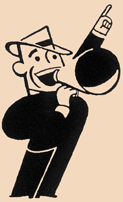

Stealing the Treasure
by
Katie Davis
Okay you swabbies, all hands on deck! We're going to make those internet pirates walk the plank.
Sorry. I got carried away with the whole pirate theme. But then it's easy, isn't it, to imagine keelhauling anyone who steals your artwork? What can you really do to protect yourself from internet pirates? Or for that matter, from anyone who wants to steal your ideas?
Well, in the good 'ole American tradition, you can sue the suckers. But then you're talking about spending some big cake to pay for the privilege. Many years ago I created a character called Scared Guy. He was pretty successful, especially in Asia. His motto was, "Laugh in the Face of Angst." He was barely more than a stick figure, the extreme personification of fear: his strings of hair standing on end, his hands raised in the air. When Scared Guy was at his peak, and I lived in Los Angeles, some guys opened a store there called Don't Panic and used his likeness as their logo. A friend of theirs came to my storefront studio and wanted to give a gift to them. She asked me to paint their rip-off version of my character for them since mine looked exactly the same! I looked into suing. I was told it would've been 30k just to step into the courtroom. And that was over a decade ago.
When you create a piece of artwork it's automatically copyright protected. An idea isn't. The artwork, however, is tangible. The way you can show it's copyrighted is to sign and date it, and put a copyright symbol (circle C) on it. That tells other people it's protected.
That said, there isn't any way to really protect yourself on the internet (or otherwise, for that matter). You can do physical things, like make your art so small it won't reproduce, or make it unavailable for downloading. My computer arts teacher, Linda Sturm told me soon there'll be programs (if they're not already out) that will enable you to embed tracking capabilities so you'll know whether anyone is stealing your art. But how do you strike the balance between protection and those times you want someone (like an art director) to take it so they'll remember your work and possibly hire you later?
My philosophy is (and since this is my column, I get to spout my philosophy) laugh in the face of angst. In other words, don't worry about it. If someone is so desperate that they have to steal from you, pity them. My friend Peter Reynolds (The Dot, and illustrator of the Judy Moody series) told me, "I will be the one who will be able to maintain my work over time... so if they steal one image - that is all they have -- and if they do their version of my idea... it won't look or sound like me... so I just wish them well."
To annoy you further with Pete's equanimity, he continued, "I look at it like 'inspiration' - we all get ideas from the world around us - including the art and stories we see and experience."
Pete's right to be so philosophical about it. It takes a lot of energy to fuel the fear of getting ripped off. As artists, we are creators. I like to think of the thieves who steal our creations as pathetic automatons who have no inner beauty.
Okay, I'm being an idealist. But unless you're going to hide your art in your closet, or are willing to spend a lot of money on lawsuits, just laugh in the face of angst and go draw a picture.
To learn more about Katie and her books visit www.katiedavis.com
![]()